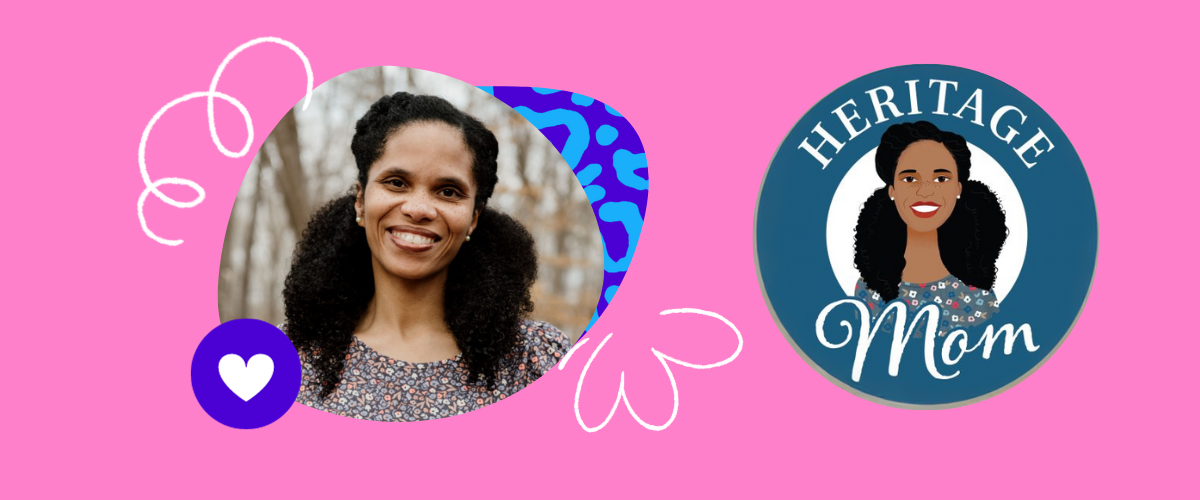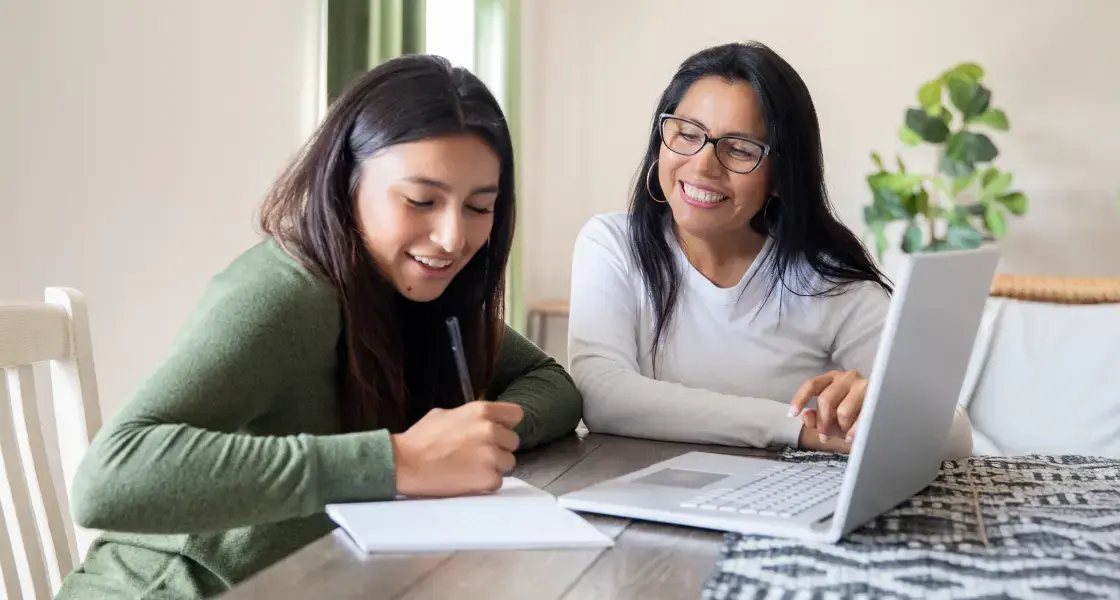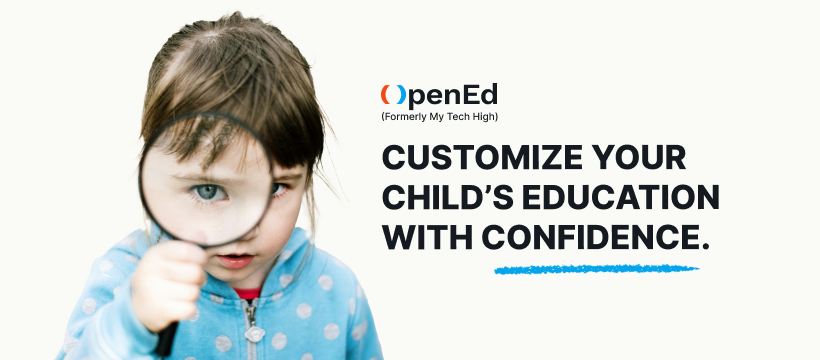Lessons from Heritage Mom
We recently had the privilege of hosting Amber O'Neal Johnston, also known as Heritage Mom, on a special Outschool workshop. In addition to being the driving force behind Heritage Mom, Amber is also an advocate for homeschooling and inclusive education. She's passionate about infusing diversity, culture, and love into traditional curriculum and creating a nurturing home environment. You can explore her insights on her website and follow her journey on Instagram.
Amber is a sought-after contributor to the thriving Wild + Free homeschooling community, sharing her expertise on homeschooling, living books, and worldschooling. You can also catch her as a guest on popular podcasts and find her at numerous homeschooling, education, and parenting conferences. But Amber is not just a homeschooling expert; she's also an Outschool mom, so we loved getting her unique perspective and insights.
She was kind enough to join our Outschool Parent & Caregiver Community and share her story. Amber's message on claiming freedom within the homeschooling journey was simply captivating, and it got us thinking.
In this blog post, we'll dive into the key takeaways from her discussion. You won’t want to miss her insights into accepting our own and others’ contradictions and what it means to create and freedom belonging in our parenting and homeschooling.
How the Heritage Mom started homeschooling
Amber’s homeschooling journey began when she discovered Charlotte Mason's educational principles. Despite being a product of public education and the daughter of public school principals, she fell in love with homeschooling. But she soon realized that even in her own schoolroom, the stories and achievements of Black people were missing. It inspired her to blend traditional classics with "life-giving books" and create a culturally rich home environment for her children. Now, Amber's mission extends beyond her own family–she believes every family should be freed to provide a holistic education for their children.
In addition to private consulting and running a local non-profit homeschool support group, Amber is a trusted voice in curating diverse and inclusive homes. Her expertise includes home education, family history, life-giving books, the beauty of homemaking, global travel, and more.
Amber's warmth, curiosity, and confidence shine through, making her an inspiration for parents and educators.
Embracing your contradictions
Amber shared how difficult it was to be herself as a child and teen. Everyone wanted her to fit into a neat category, even though she was full of ‘contradictions.’ And how she still feels this from the world and homeschooling community.
How can they categorize you if you travel the globe with your children, expose them to the world, use fresh veggies grown out back to make scrumptious dinners from scratch, and curate an incredible home library full of books your kids can fall in love with. But you also give your children mindless screen time and lots of video games. Who are you? What if you feel like a chameleon, but people want you to pick a color, any color, and just be that?
When I was in high school, our cafeteria was completely segregated. Most of the tables were filled with white kids of all sorts. There were a few Mexican tables and one Black table. Upon arrival, I was naive because I assumed that we could all sit wherever we wanted, depending on the day. If I wanted to chat it up with one of my white friends that I'd been in school with since first grade, I could just plop down next to her and laugh like we always had. I also thought that on a random Wednesday, if I wanted to sit at the lab table with a couple of friends from church and laugh about how crazy our dads looked in their nerdy tennis shorts on Saturday, I could do that too…. Little did I know that the rules changed in high school.
Now, you had to pick a table and stay there every day. You could cross color lines, but once you crossed, you couldn't return…. So, after realizing that stepping into the teen world robbed me of my freedom to choose who I could be on a given day, I bowed out. I went to my guidance counselor and dropped lunch. Did you even know you could do that? It's true. I quit lunch because I couldn't eat in peace, so why bother?
Once I got out of high school, I was so happy to leave a lot of those weird shenanigans behind. I embraced the freedom of young adulthood and leaned into the fullness of who I was. And I existed in that space for a long while, sheltered from the trauma of having to shed my prismatic, multifaceted nature. But recently, I've noticed some of those same triggers surfacing. The pressure to pick aside and stay on it is running rampant throughout our society. We see it in politics, COVID protocols, denials for social justice, and religion and civil rights legislation. And even in education, especially history, education. Wading through all that muck is heavy and hard, but most of it has always been there. That's not necessarily what's new. What's new for me is feeling it so strongly within the homeschooling community.
Amber shared how she frequently gets messages with the theme of, why did you do X? I thought you were Y? In other words, why don’t you fit into my box?
It usually goes something like this. I thought you were conservative. Why did you share that magazine full of the liberal agenda? I'm really surprised that you let your kids read that. I thought you were Christian. Why do you share posts from Muslim moms? I was disappointed that you posted your daughter's drawing. (It was a beautiful sketch of a girl wearing a hijab.) I thought you supported diversity. Why do you speak in all-white spaces? They're just using you to look good. I thought you were about building bridges. Why do you run a homeschool group for Black families? If I did that, it would be considered reverse racism. I thought you were liberal. Why do you do that?
This pressure is one reason it’s so important to let our kids be themselves and to remove the labels.
“What if we chose to give each other the gift of freedom? What if we chose to say, sister brother, I expect you to be full of contradictions. I know that you are bigger than the labels society puts upon you, but you can rest with me."
Remember, we're not limited to labels or societal norms. Freedom means being genuine and letting your kids do the same.
Creating safety and belonging in homeschooling
Amber also shared a personal story about a writing mistake she made and the subsequent backlash. It was a reminder of how so often, as parents, instead of supporting one another when we make mistakes or need help, we turn into “circling sharks looking for any hint of blood we can attack so we can attack our own,” Amber said.
When we see one of our sisters or brothers bleeding, we certainly should be encircling them. But it should be a circle of protection, a covering, to allow them time to learn and grow. We've been called higher, and at the very least, we can offer each other the freedom to make mistakes and be forgiven. Otherwise, we're failing in love.
We don’t need to stay in a box, and we don’t need to get everything “right.” And we need to give others the same freedom. We are allowed to make mistakes. This mentality nurtures a freedom-focused environment for both parents and kids.
Among home educators, I've always felt that freedom was embraced. There seems to be an unwritten understanding that we've all chosen to live against the grain in the way that we raise our children in this collective, and attitudes spilled over into a unique pool of juxtapositions. Among homeschoolers, we were able to be ourselves even when the world dictated otherwise. But I see that freedom being threatened.
Maybe it's because COVID blurred the lines of who is and who isn't homeschooling. Or the ‘parent wars’ about where your kids will be educated. Perhaps the pandemic pierced our bubble, and we've lost our identity. Or maybe we've simply lost our way. But the only way to deal with an unfree world is to become absolutely free. That your very existence is an act of rebellion.
Likewise, Amber reminded us that in homeschooling, it can be easy to argue and segregate over differing philosophies and educational approaches, but that we should instead focus on creating freedom and belonging.
What if we drew in the parents within our sphere of influence and cared for them in a way that let them know that when your little girl has a daughter who marches to the beat of her own drum, with or without a diagnosis, shows up in all her nose-pierced blue-haired glory, I will stand at the door of this safe space as a guardian to ensure that your little girl knows for sure that she belongs.
Our homeschooling journey doesn't have to fit into a single mold. It's about exploring various educational approaches and forming wide friendships within the community. The more diverse, the richer our homeschooling experience.
Conclusion
We are so grateful to Amber for sharing her wisdom with us. We hope you’ll get to know her better through her site and socials, and especially check out her book recommendations.
We left our conversation reminded that in a world filled with expectations and restrictions, homeschooling can give special freedom. We hope her parenting and educational approach inspires people everywhere. Let us remember the power we have as parents, caregivers, teachers, and home educators.
May we all work as hard as Amber to create freedom and belonging.






.svg)
.svg)







